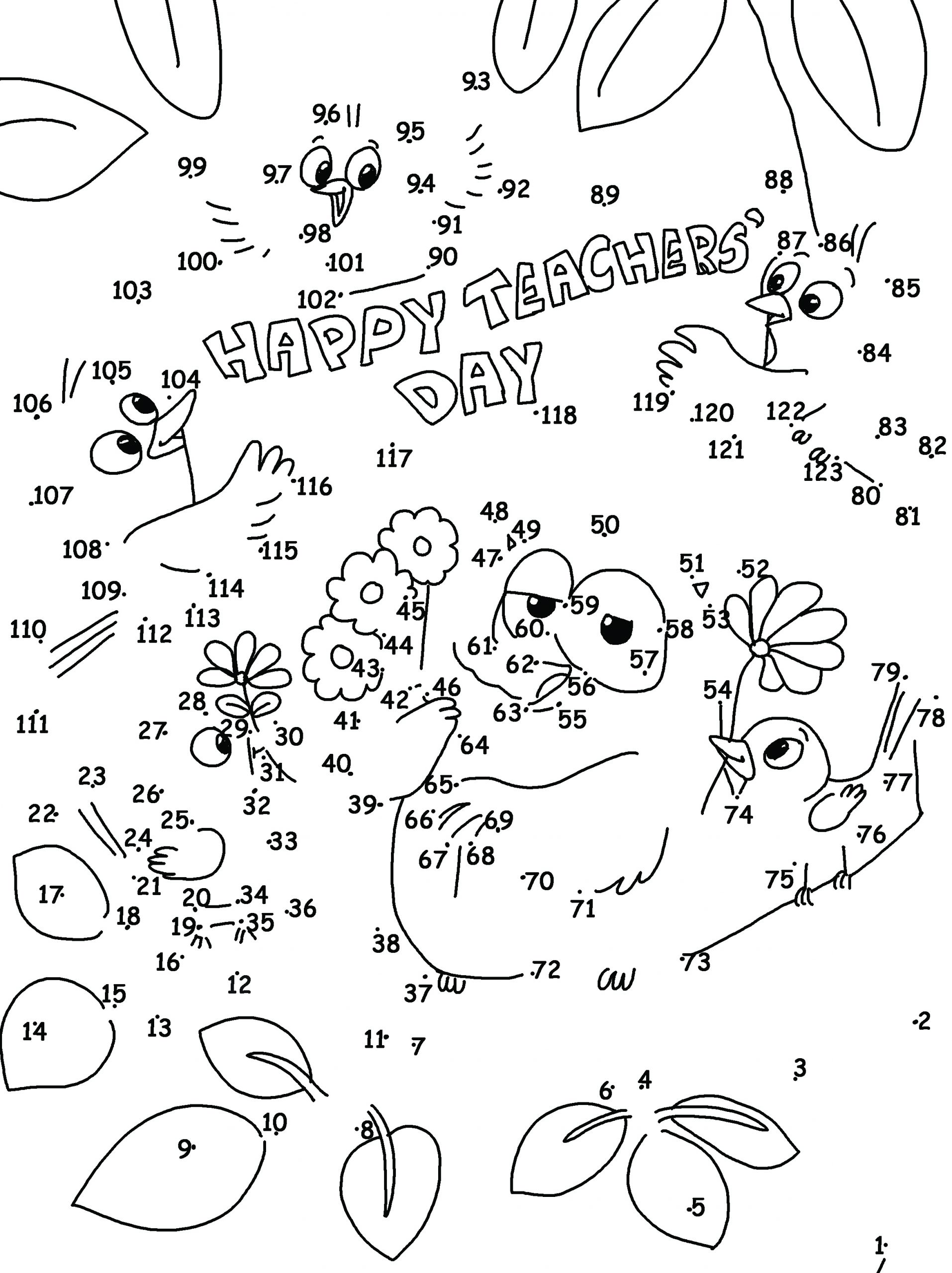
SEO Keywords: animal love

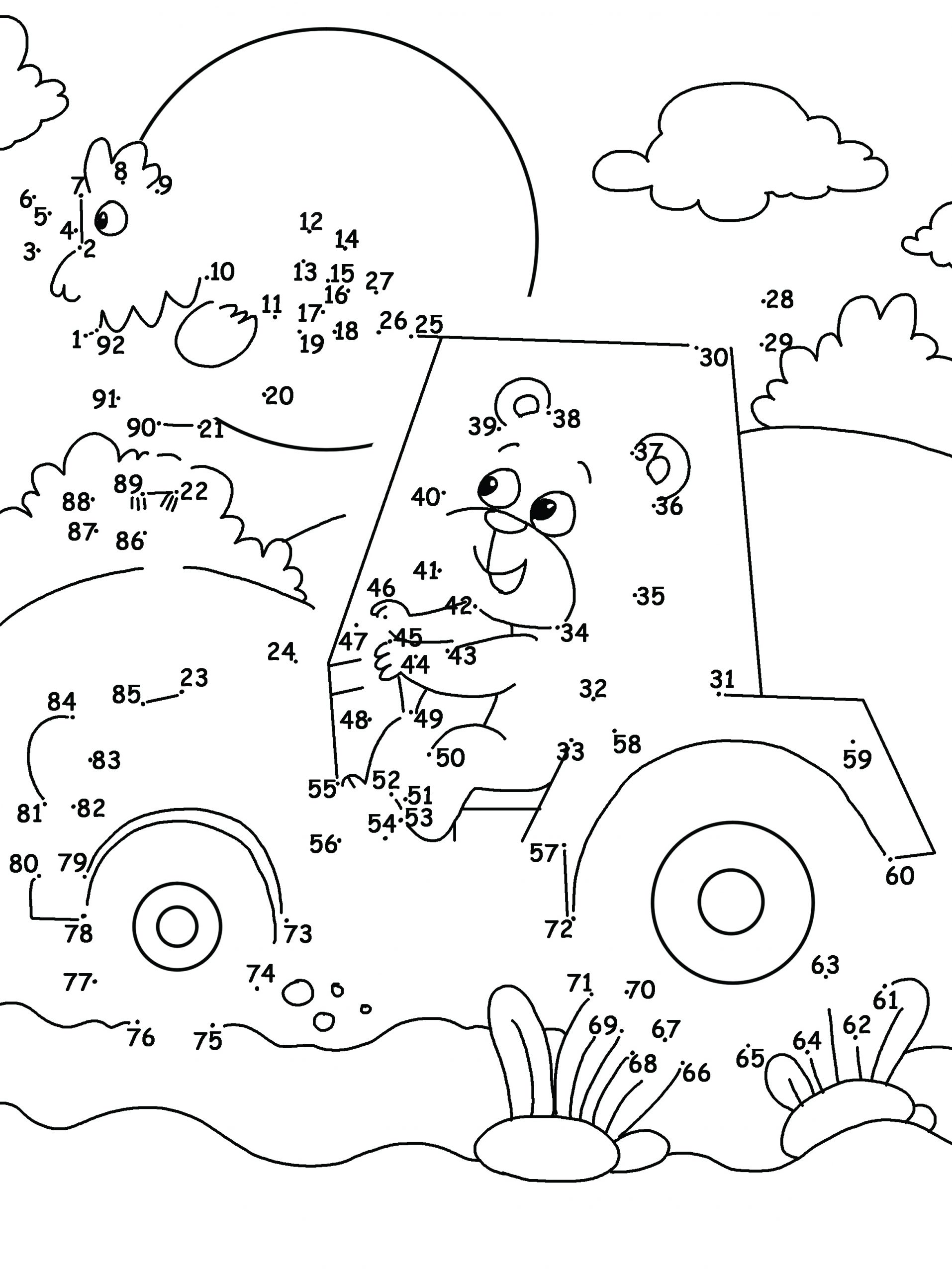
Bear Drives!
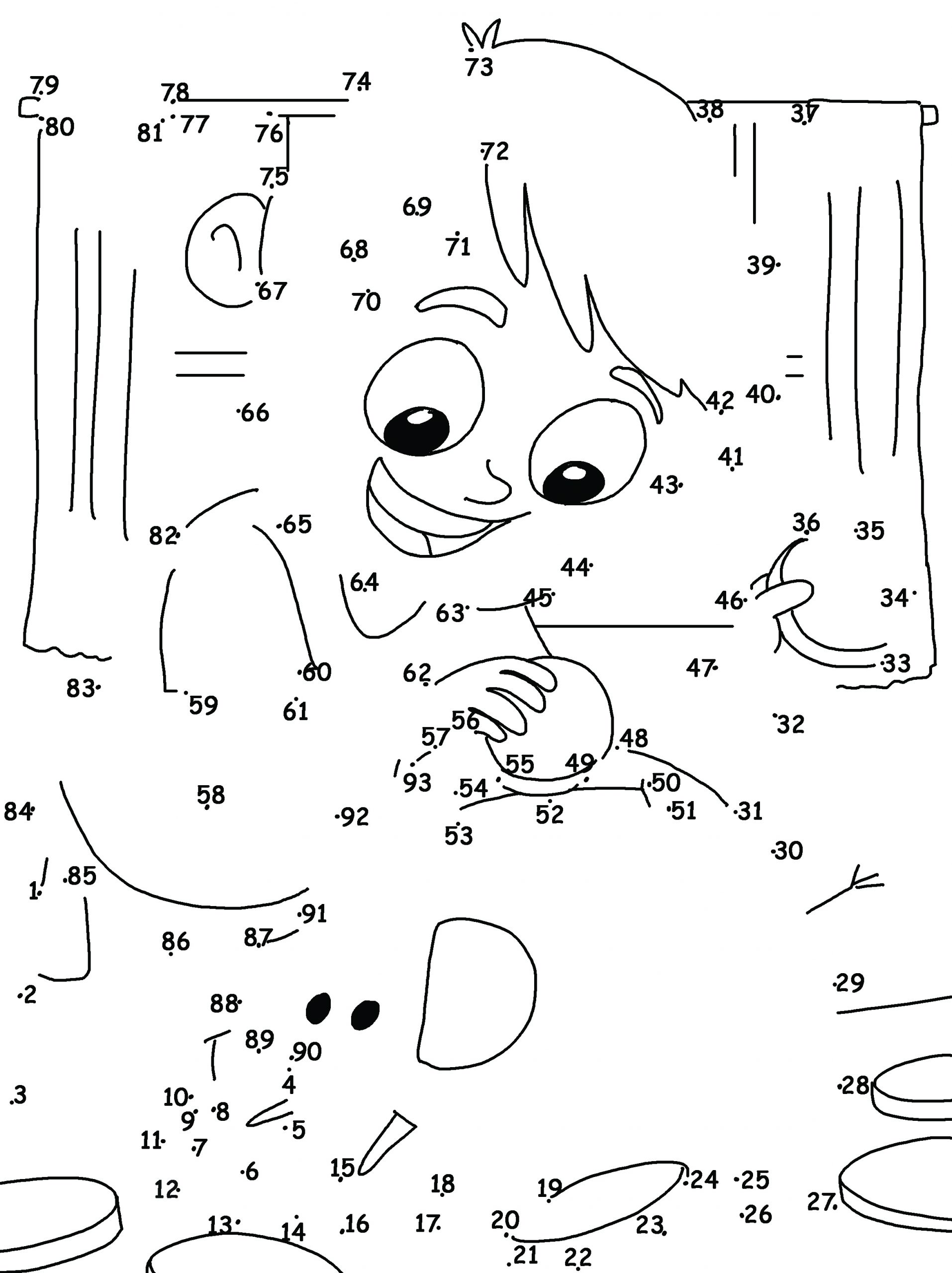
Do It Yourself!
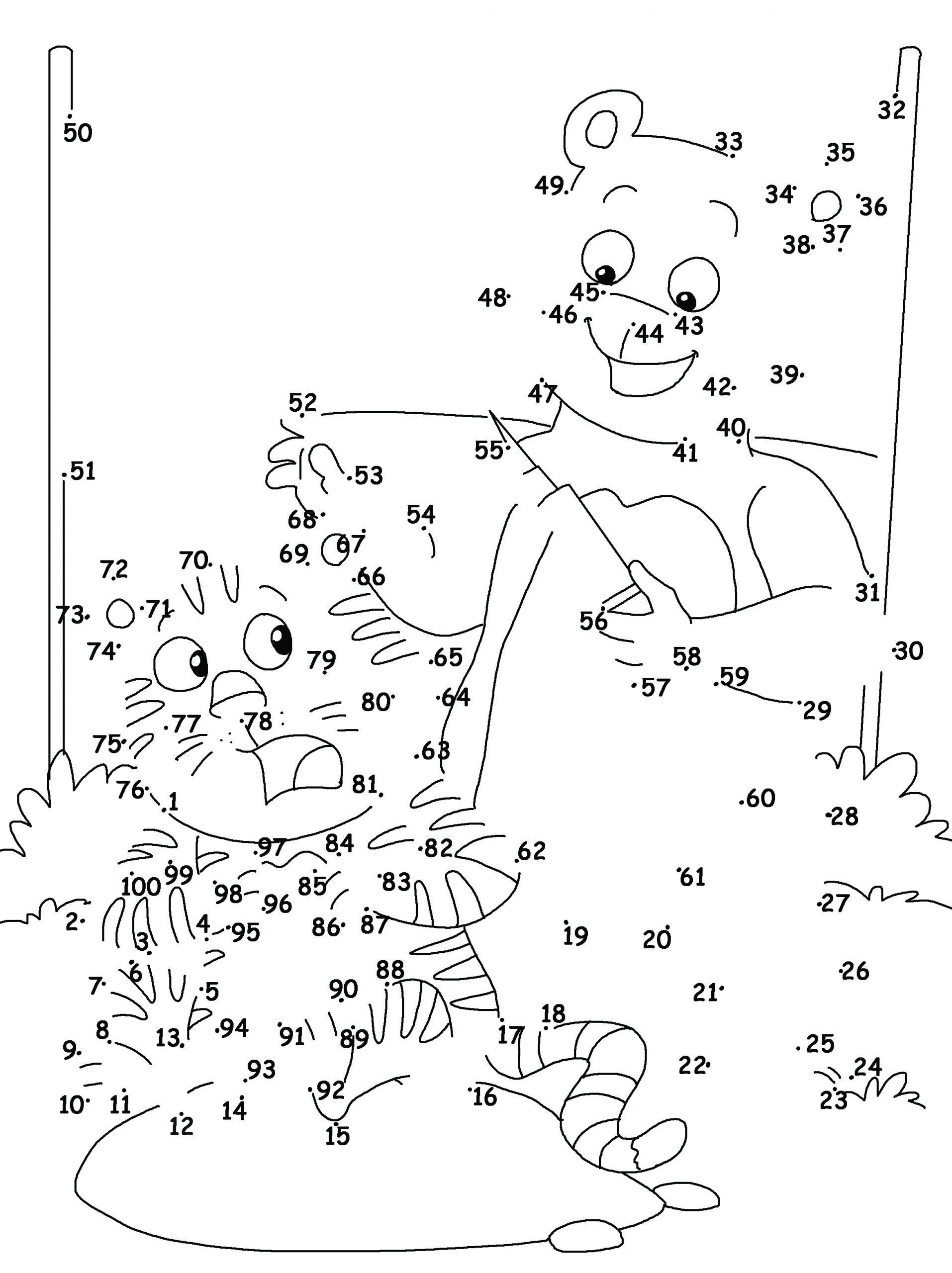
Tiger’s fear?
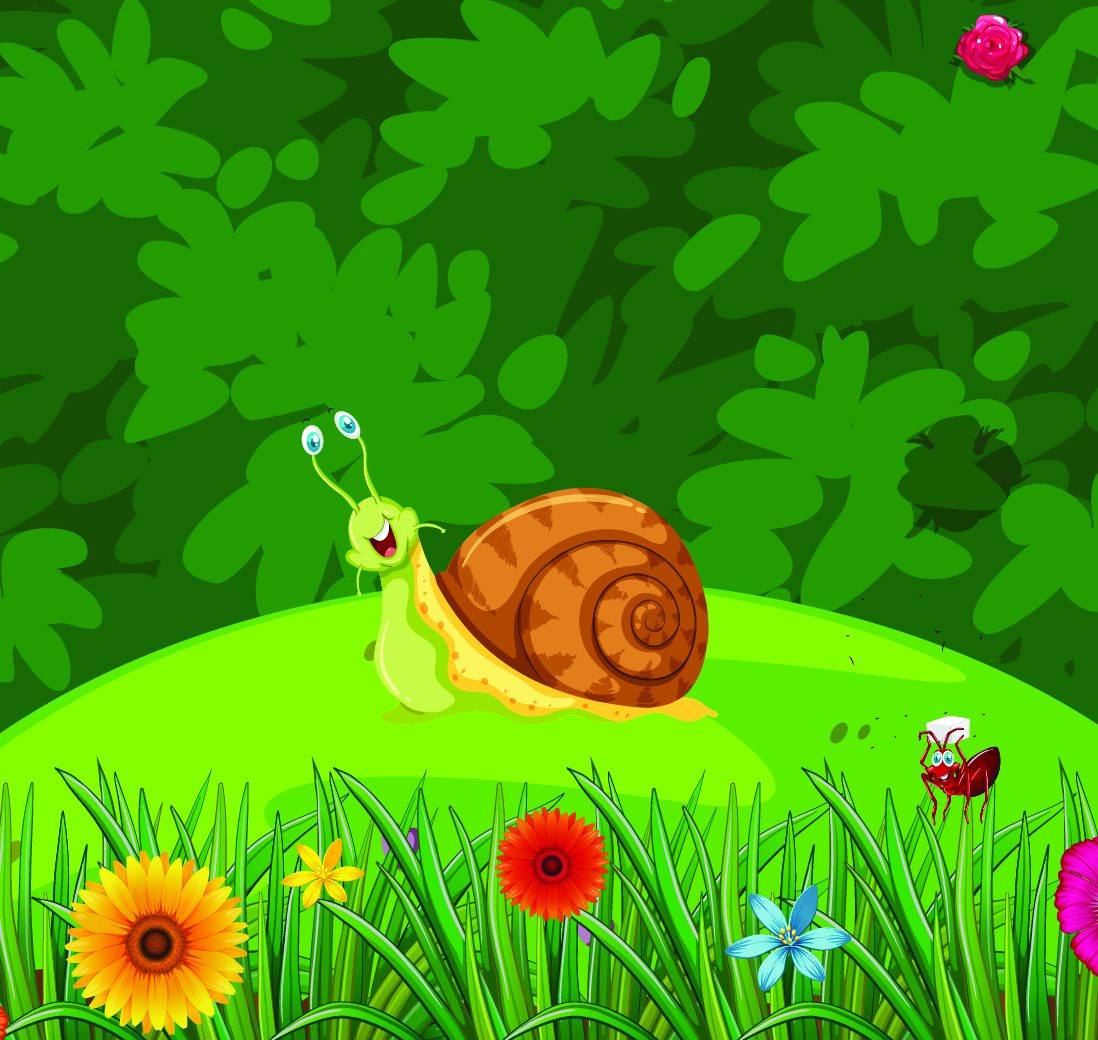
Giant African Snails
Humans grow hair, nails due to the presence of keratin in our body. But one thing that we can’t grow is a pair of eyes! However, land snails unlike us, re-grow their eyes, if damaged.
Most land snails have eyes on the ends of their two upper long tentacles. The head has one to two pairs of tentacles which have the eyes at the tips. These tentacles can regrow if severely damaged and if a snail’s eye is cut off, the antennae can regrow a new eye when the antennae grows.
Snails don’t have a clear vision, but can detect changes in big and light objects. If you place a finger in front of the snail’s eyes, it can sense it and will instantly retract or draw back its eye into the tentacle to protect itself.
The Giant African land snail is known to eat more than 500 different types of plants.

Giggling Animals
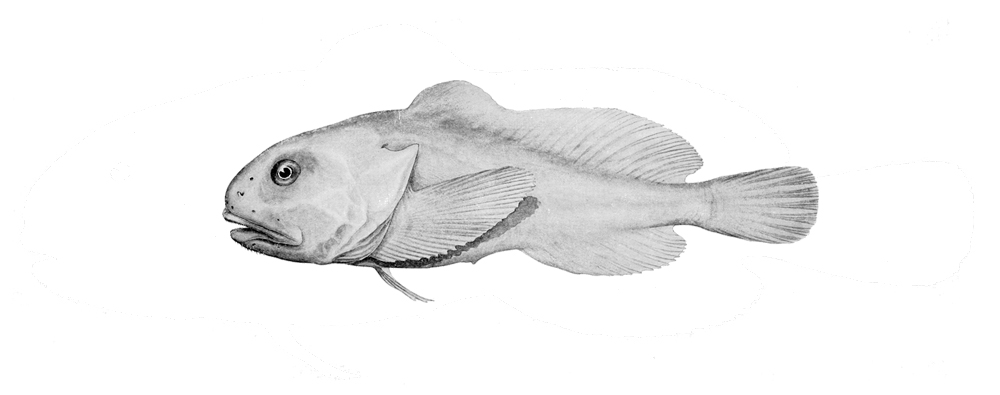
Blob Fish
When we humans stay underwater for too long, our skin changes its appearance. It begins to look pale and wrinkly. This is because water is not our natural habitat. This is exactly what happens to blobfish.
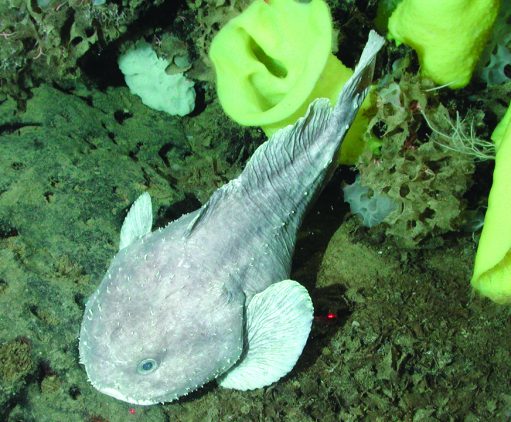
This is how blobfish look when they are deep in the ocean.
These creatures live off the coast of Australia, somewhere between 2,000 and 4,000 feet beneath the waves. Here, the pressure is up to 120 times higher than the surface.
Fish that swim in this high-pressure area have a swim bladder, which are sacs of air in their body that help them swim without cracking their bones. However, blob fish don’t have a swim bladder. Their bones and body are soft like jelly so
they don’t crack under pressure. Hence, they are able to swim deep in the ocean. The water pressure keeps their muscles tight, making them look like ordinary fish.
But when they are taken out of their natural habitat and bought up to the surface, the pressure drops, making them look saggy and droopy. This is why they are also known as one of the ugliest fish in the ocean.
Blobfish don’t have teeth. They don’t hunt and keep their mouth open to swallow crabs, sea urchins and shellfish.
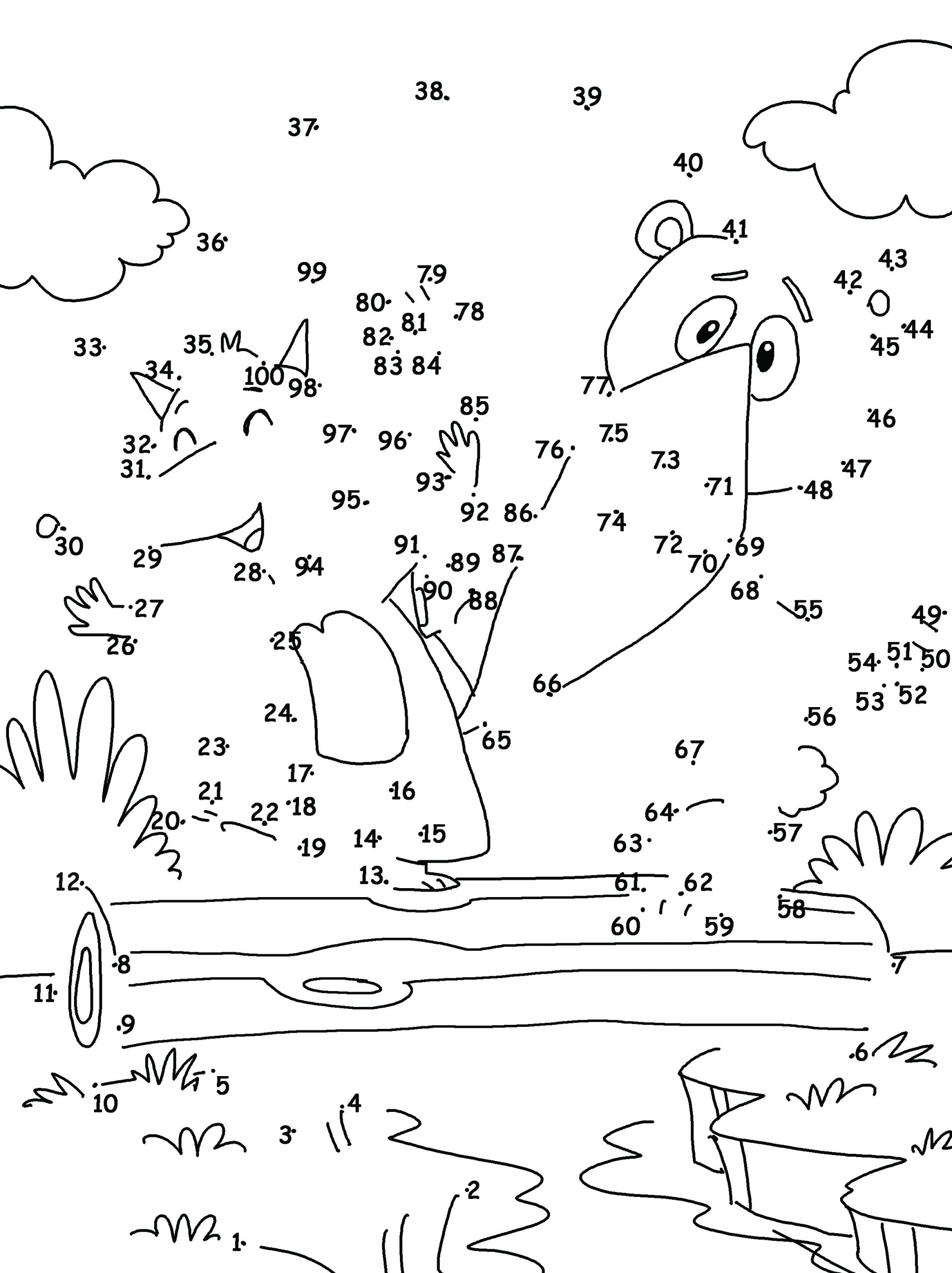
A Forest Trail!

Giant Pandas
Giant pandas are large cuddly-looking animals. They have a heavy body, rounded ears, a big head and a short tail. Found in China, these pandas eat while sitting in an upright position holding food in their hands, just like humans.
Giant pandas survive almost entirely on bamboo, which is low in nutrition. Hence, they eat 12 to 38kgs of bamboo per day to get enough nourishment. But bamboo does not digest properly in their stomachs and passes undigested. To digest as much as possible, pandas sit upright and eat for more than 12 hours a day. Sitting upright helps them use their front paws to hold their food comfortably.
Their front paws have five clawed fingers and an extra bone that works like a thumb. Pandas use this bone and their fingers to grasp their food.
As they spend most of their time eating, sitting upright leaves their front paws free to pick and trim leaves.
Giant pandas begin climbing trees when they are 7 months old.
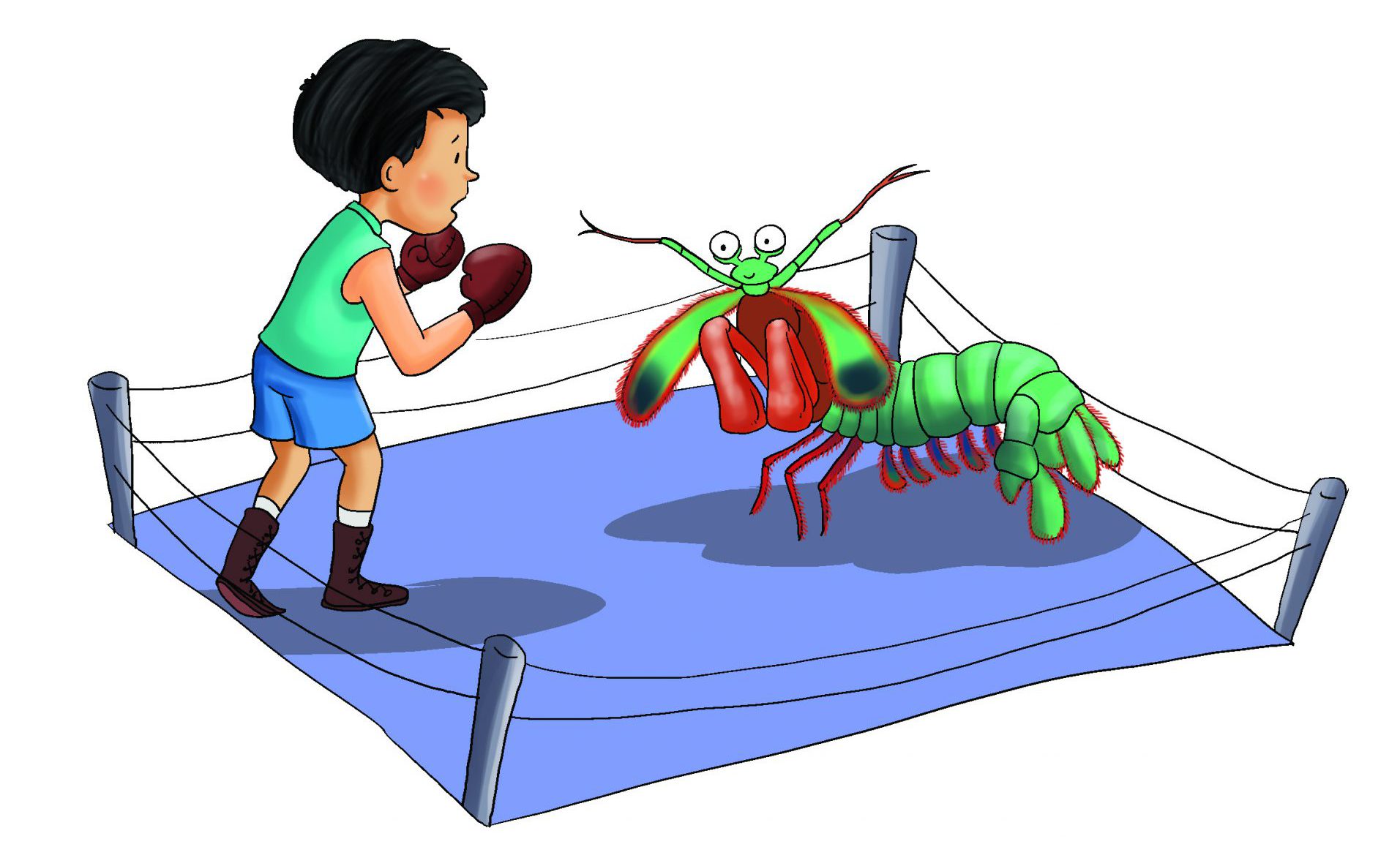
Mantis Shrimps
Humans train for years at throwing punches to become good boxers. However, Mantis shrimps have a naturally powerful punch.
Mantis shrimps are found in the shallow waters of the Indian and Pacific oceans. They are very colourful and their size ranges from two to seven inches. They are crustaceans, which means that they are animals with a hard outer shell.
Mantis shrimps can throw the fastest punches in the world. They use their powerful punch to hunt for preys. Their punches can break through crab shells and walls of fish tanks as well.
Their bodies have adapted to throw fast punches. When their upper arms contract, their body’s energy gets stored in a small saddle- shaped part in their body. This acts like a spring that has been compressed. All this energy is released at once, leading the lower arm ahead quickly. Each punch produces small flashes of light, upon impact. These small flashes occur because their claw moves so fast that it lowers the pressure of the water in front of it, causing it to boil.
A Peacock Mantis shrimp’s punches are as fast as a bullet.
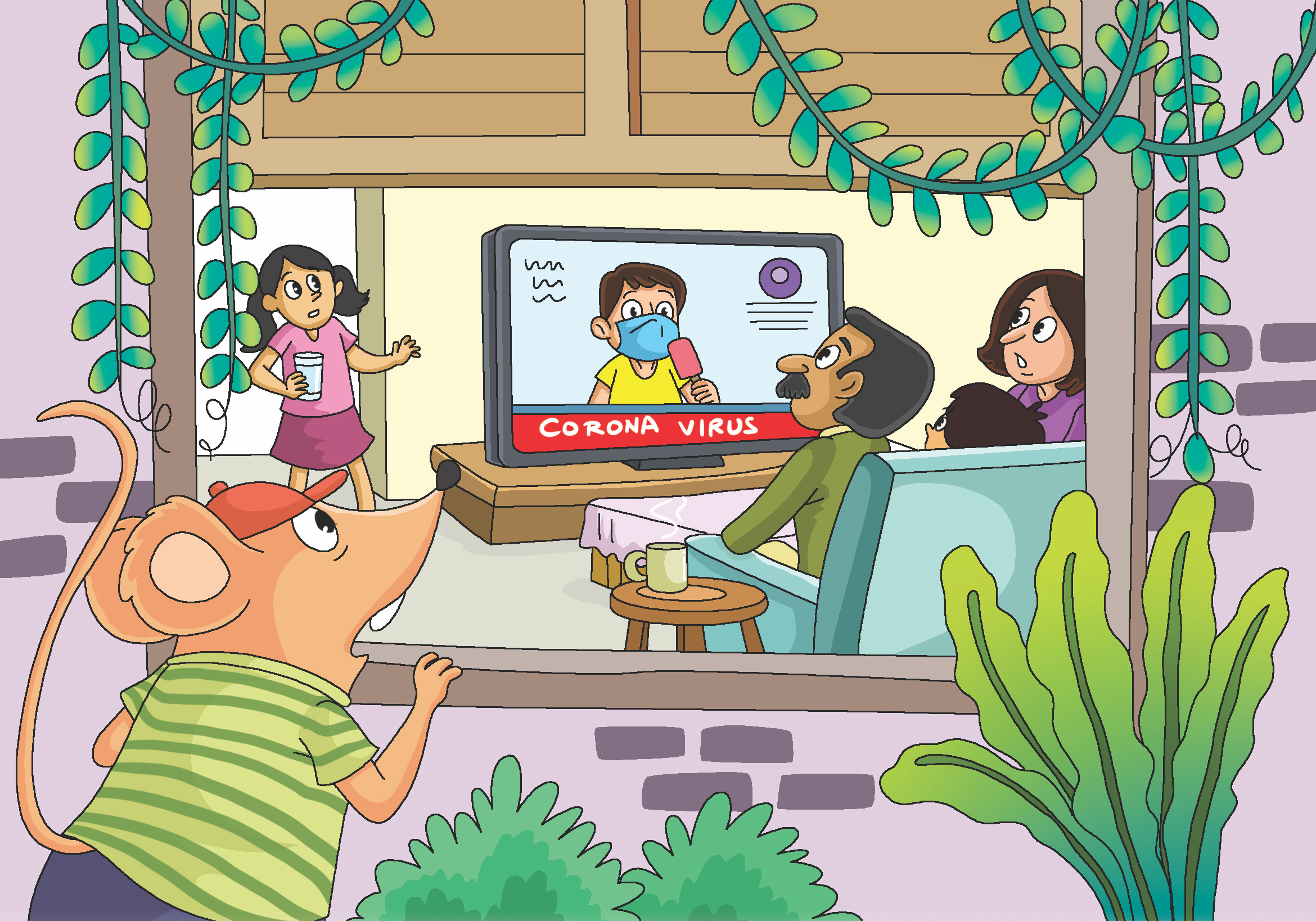
Humans In A Cage
There was silence all around. Streets were deserted and parks, abandoned. No one could be seen on the roads. It seemed like all humans were holed up inside their houses.
The black smoke from the skies had disappeared and the air was less polluted. Rivers, too, were cleaner than before.
The animals of Champakvan couldn’t understand what was going on. They were called for a meeting by Blacky bear in the morning on the banks of Crysty River.
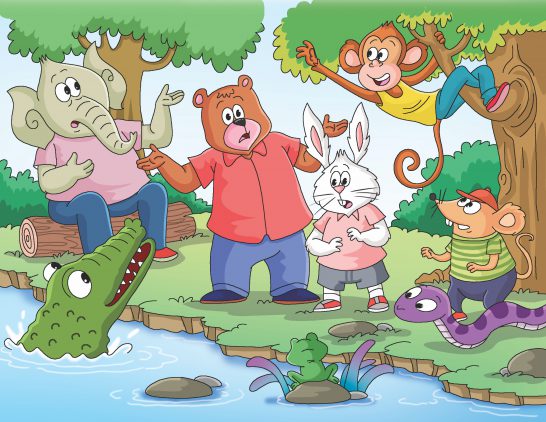
After greeting everyone, Blacky asked, “Where are the humans? What has caused this sudden change? Why do all the cities look deserted? What has caused the noise and air pollution to reduce?”
Blacky Bear asked many questions and looked at the other animals for answers.
“I have heard that a disease has taken over the cities, villages and towns. It is forcing the humans to stay in their houses,” said Jumpy monkey who had returned from the city last week.
“What kind of a disease? How can a disease cause the cities to shut down?” asked Jumbo elephant.
“I do not have much information. It is just something that I heard from somewhere,” replied Jumpy.
“Our water is cleaner too. It seems like nobody is working at the factories as the water is not as dirty as it used to be,” said Wooky alligator, popping his head out of the water.
“It surely means that something really serious has happened, otherwise humans don’t change so easily,” Elvy python added.
“Yes, Rocky rooster also told me that humans don’t come out of their houses even after the morning rooster call,” said Cheeku rabbit.
After listening to all of them, Blacky took some time to think and then said, “We should try and find out what is happening. I hope this silence is not a warning for some kind of danger approaching our forest. Let’s find out if this is a conspiracy against us. We should send someone from our forest to the city.”
“Meeku mouse can go. He is fast and small and can enter any house,” said Dumpy pig.
“Yes, I agree. Meeku will be good for this job,” added Dodo Peacock.
“Can you do it, Meeku?” asked Blacky. “Sure, I can. It will be my pleasure to be able to do something for our forest,” replied Meeku and left for the city immediately.
On reaching the city in the afternoon, he noticed that many shops were shut and very few people were on the roads wearing masks. He went inside one of the houses and saw a family watching television.
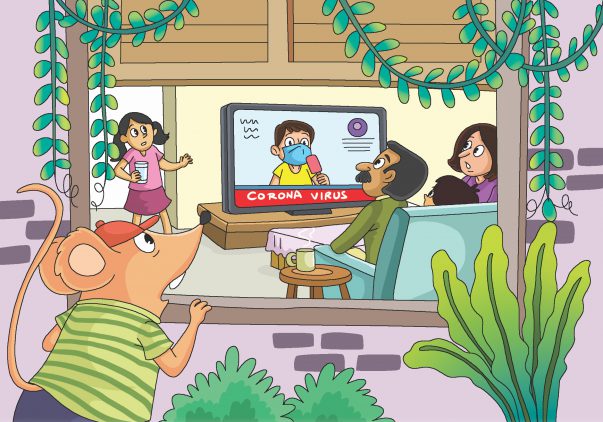
A news programme was announcing the rising number of cases and listing the precautions people should take. Meeku left from there and entered another house.
Here, the television was on but no one was watching. He heard the news host saying, “Coronavirus is spreading fast. Those who have symptoms like runny nose, cough or fever should report immediately. An infected person needs to maintain distance from others. People should stay at home and only step out to buy essentials.”
Meeku went into yet another house where he saw a little kid drawing and talking to his grandfather.
“Grandpa, how do you like my drawing?”
“Wow! Karan, this is lovely. You have shown how all the animals are roaming freely and humans are sitting at home,” said grandpa.
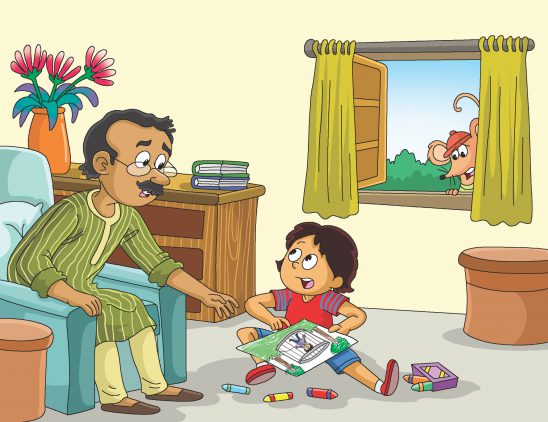
“It’s true, grandpa. Now, humans are locked in cages while the animals are merrily roaming outside. They are free and not afraid of any virus. When will this coronavirus leave us, grandpa?” asked Karan.
“My dear Karan, until we find a vaccine that can save our lives, we have to follow certain rules of maintaining social distance, washing our hands regularly and eating healthy food. We cannot stop the virus but we can stop it from spreading and hope that this pandemic gets over soon,” explained grandpa.
“Why is it called a pandemic, grandpa?” asked Karan.
“Because it is a disease that has spread to all the countries in the world,” replied grandpa.
Meeku understood the situation. He left the house and ran towards the forest. Another meeting was called in the forest where Meeku explained the whole situation to everybody in detail.
He told them, “Champakvan is not under any threat. It is the humans who are facing a threat from a disease called coronavirus. Let us hope they learn something from this situation.”
This eased the unknown fear that the animals of the forest felt. They hoped that the helplessness the humans faced goes away for good.

Do it yourself!
“How hot it is! When will it rain, mom?” asked Bolt, Misha cheetah’s cub.
Anandvan forest had no rains. Animals did not have enough food. The forest had always been short of water and now, whatever little water was there, quickly dried up under the hot sun.
The days were hot and dry, and the nights were eerily uncomfortable. Birds and animals with fur like bears were suffering the most.
Misha lived in the forest with her cubs.
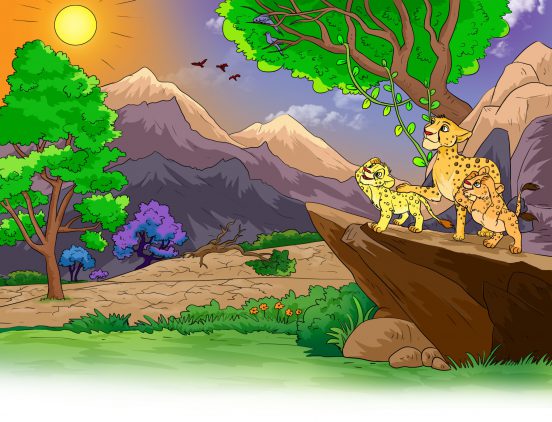
Clouds would form in the sky every day but would break without rain. The months of monsoon passed, but not a drop of rain fell from the sky.
Drought was declared in the forest. The Forest Administration advised all animals to move to other forests.
When the animals started migrating with their kids, the hawks arrived from other forests and said that animals from other forests were moving towards their forest. There was a drought everywhere and no one knew where to go.
The animals called for a meeting. It was decided that no animal would eat another during the meeting.
Deer, squirrels, buffaloes, zebras, cheetahs, tigers, bears, foxes, and rabbits—all came together.
King Sheru said, “Friends, we are facing drought because of the human race.
Because they believe they are superior, they have cut down trees and destroyed forests, constructed dams over rivers, drying them, and leading the planet towards destruction. The weather has altered. It doesn’t rain during monsoons, it isn’t cold during winters, and summers are increasingly hot. Our food chain is being destroyed because of no food and bad water.”
“So we too must destroy the humans.
Down with humans!” shouted Foxy fox.
The others repeated after him, “Down with humans! Down with humans!”
The whole forest started chanting in hatred of humans.
“Quiet!” said King Sheru in his firm voice and everyone fell silent. “Tonight, we shall attack the human city closest to the forest and take their food and water. They too should know what it feels like when they starve.”
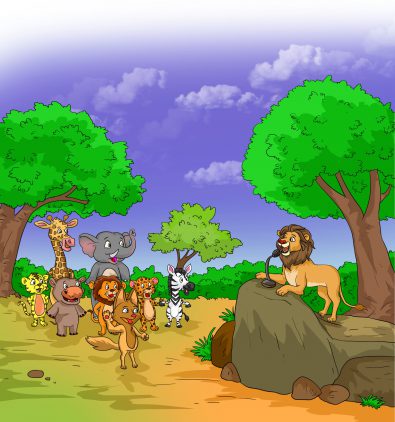
The animals clapped at their king’s decision and waited for nightfall. As soon as the sunset, tigers, bears, jackals, and cheetahs crossed the forest borders to hunt the human territory.
But the humans had good security systems in place, so the animals could not do much and just about escaped the traps set for themselves and returned.
The news about their failure spread through the forest.
King Sheru called for another meeting.
Some hyena who had been beaten up by the humans were standing in one corner and shivering with fear.
“Residents of the forest! We can’t live in fear! We must keep fighting! In this struggle for survival, we must…”
But before King Sheru could finish, Misha interrupted him and said, “Your majesty, with your permission, may I say something?”
Misha was loved and respected by everyone because she was a wise animal who found solutions without blaming or fighting.
The king nodded, and Misha said, “Friends! Our fight is not with humans but with what they have done. They have misused their knowledge and have caused destruction to nature. The earth is heating up. The glaciers are melting but not just us, the humans too are suffering because of it. In some years, they too will face scarcity of food and water.”
Everyone listened to her attentively.
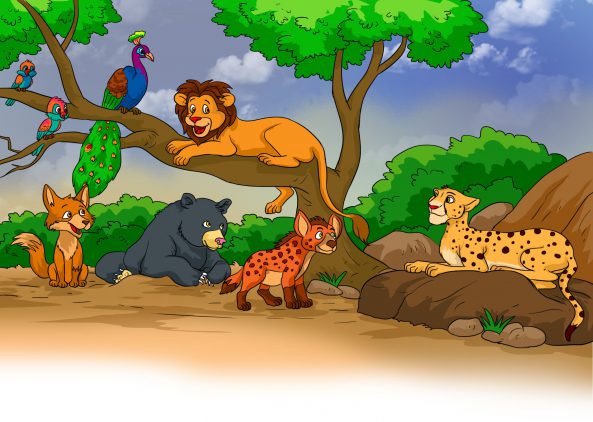
“If we attack humans,” continued Misha, “we will not survive. They are stronger than us.”
Some animals, like the hyenas, who had been beaten agreed with her, but the others still wanted revenge.
“Do you have a solution to the problem, Misha?” asked the king.
“I do, your highness, but it’s going to be time-consuming and slow,” said Misha.
“Do tell us!” said the animals.
“We should try and grow our own food instead of stealing food and water from humans. Everyone will have to work hard and have the patience to see the results.
If it does not work, we will try another way,” she said and explained what had to be done.
Next morning, the work started. Barren lands were dug by oxen and birds got the seeds sown. Elephants and bears got water from far away lakes that still had water.
All the animals and birds contributed to the cause based on their skills and all helped each other.
Working hard, they believed Misha’s plan would bear fruits. They knew about farming as they had seen humans do it.
Days passed into weeks. But neither did the weather improve, nor was there any sign of food.
All their hard work seemed to have failed.
They started thinking they would rather have stolen food. They decided to go and attack humans and called for a meeting with their king.
They had only just reached his cave when lightning struck. The entire forest lit up in a flash and it started raining. Where seeds were sown, saplings appeared and the lakes started filling up.
With the crops growing, food problems also slowly began going away. Since the herbivores could now eat, the carnivores were hopeful about having food too.
Misha’s plan had worked, though it took time.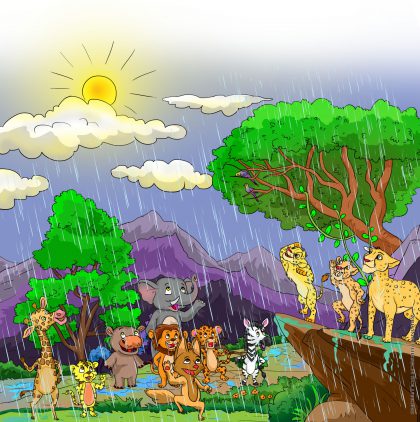
If they had attacked humans, there was no guarantee of a continuous supply of food and water.
They had learnt that if you wish to do something, the best way was to “do it yourself.”
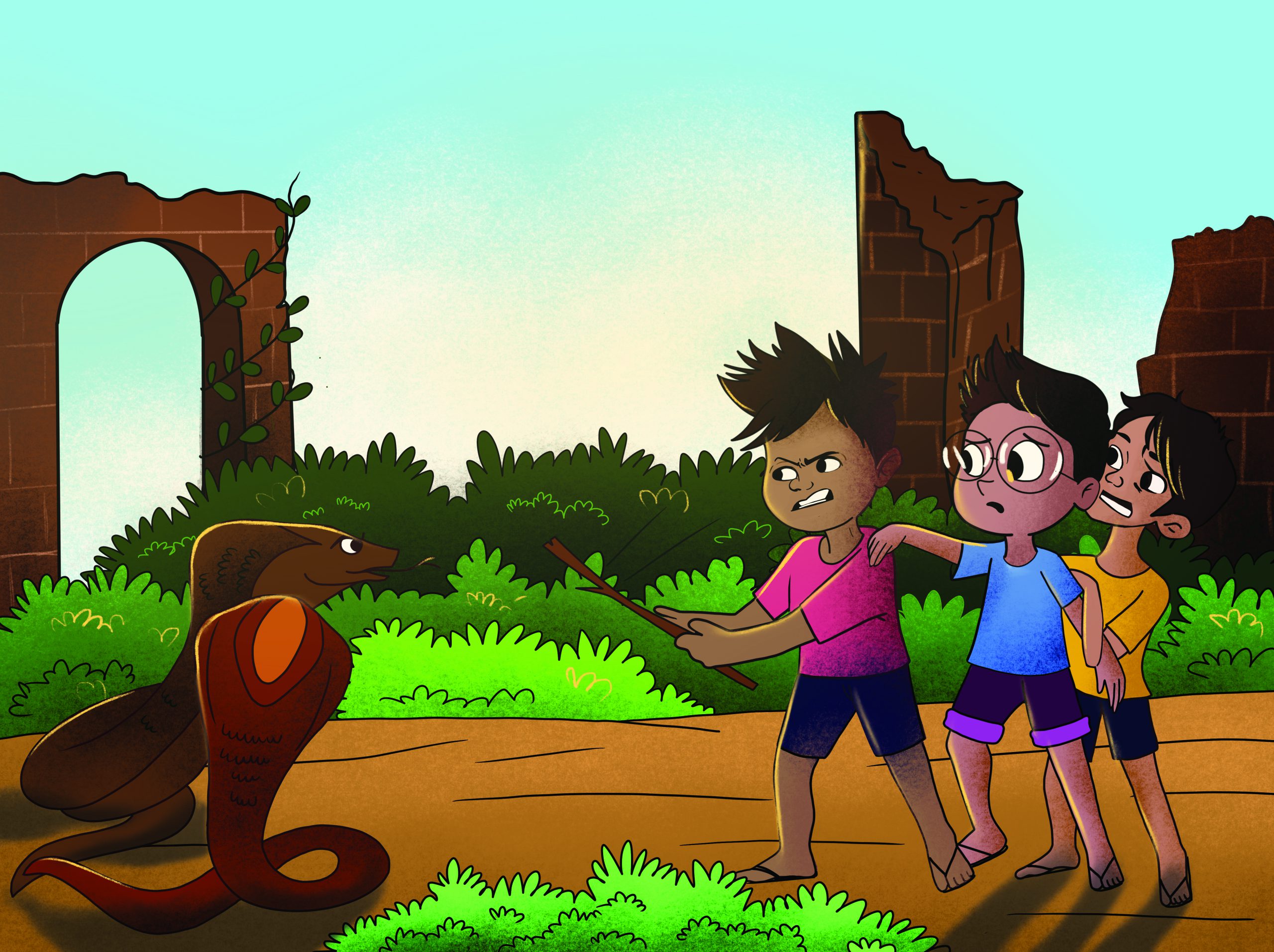
Treasure in the well
“Yash! Yash! I just learned something interesting!” said Karan, panting.
“Karan! Catch your breath first? Now, tell me, what it is?” said Yash, resting his bat on his shoulder.
“About three kilometres from here flows Ratna River. On its shore, there is an old house with a well.”
“What’s special about that?” asked Yash.
“Oh, Yash! Don’t you know? The British have hidden a truckload of treasure inside that well.”
“How do you know there’s treasure inside the well?”
“My grandpa told me that during the revolt of 1857, the British government had hidden its treasure in that well so that the revolutionaries would not lay their hands on it. The British were killed during the revolt, but the treasure is still inside the well. No one has found it till now.”
Yash thought for a while, and then said, “Karan! The treasure in the well can be ours! We’ll do what no one has done!”
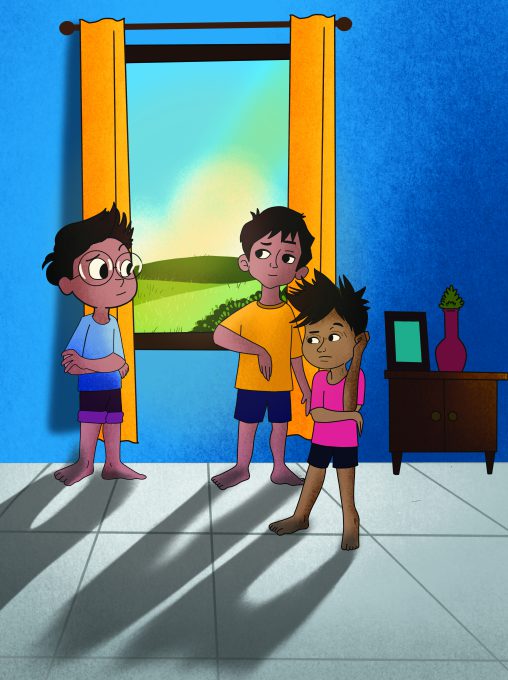
Yash and Karan talked and walked towards their closest friend, Mohan who had an analytical way of thinking.
Mohan loved reading detective stories and had learnt about being a detective through them.
He listened to his friends attentively, and then said seriously, “Hmm! A treasure in the well! We will find it, no matter how hard it is.”
The three of them started drawing up a plan and decided to go on Sunday to find the treasure. They also agreed to collect things that they would need to draw out the treasure.
They collected large bags to put the treasure once they got it, and sticks with pointed ends like spears to fight off any danger they may face. They took a large rope for getting inside the well, and a pickaxe for digging.
On Sunday morning, the three friends set off on their treasure hunt fully prepared.
Their first obstacle was the way to cross the Ratna river. Though the river did not seem to have a lot of water, they didn’t know its depth. They took off their clothes and shoes and put them in a plastic bag.
They used their sticks to measure the depth of the river and started walking across it slowly. They walked through the parts where the water was shallow and avoided the deeper pockets.
They had almost reached the shore when Yash screamed. “Ouch! Ouch!” and jumped and rushed towards the land. Mohan and Karan got scared and followed Yash quickly.
When they reached the land, they found Yash stamping on the ground. They saw that two leeches were attached to Yash’s legs and they had become swollen sucking his blood. Yash tried shaking them off, but could not. He was screaming now.
Hearing the screams, a farmer working in a field near the river came running. He saw Yash stamping and understood what had happened.
He immediately pulled out a small bottle that had white powder from his pocket and sprinkled some on the leeches and they came off Yash’s legs at once.
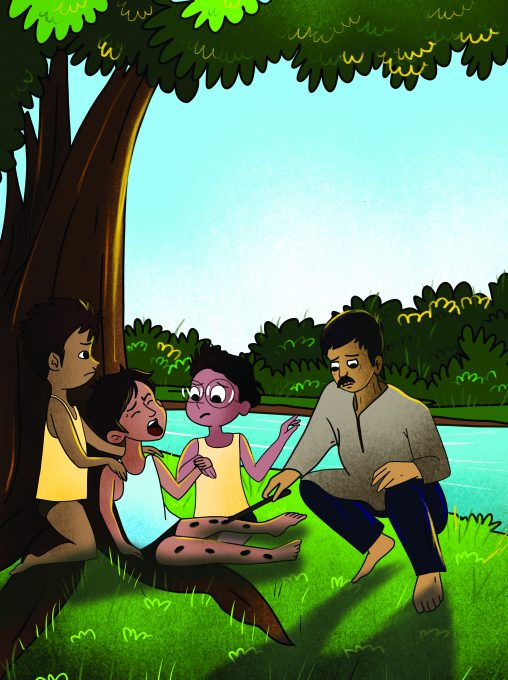
“There are a lot of leeches in this river,” explained the farmer. “We bring our cattle to bathe here and they stick to their legs too. The only way to get rid of leeches is to sprinkle salt on them. That’s why I carry a bottle of salt with me!”
Yash thanked the farmer, and the three friends began walking towards the old house. They had just crossed a field when they heard a buzzing noise. A swarm of bees were coming towards them!
Yash and Karan turned around to run but Mohan yelled, “Put the treasure bags over you!”
The three friends immediately put the empty bags over them. Through the bags, they could hear the bees buzzing and were scared they would get stung. But luckily, the bees flew away and the three friends removed their bags, looked at each other and laughed in relief.
“We didn’t expect our hunt to be full of dangers!” exclaimed Yash.
“Yes, shall we go on?” asked Karan.
“Yes, of course! We’ll find that hidden treasure!” answered Mohan, and the three of them marched ahead.
They soon reached the old house that looked like a ghost house. Trees and bushes had grown through its walls. The windows were broken and covered with cobwebs and looked dark and scary.
But even more scary was the snake in front of the house! Soon, a second snake joined it and the children recognised them as poisonous snakes.
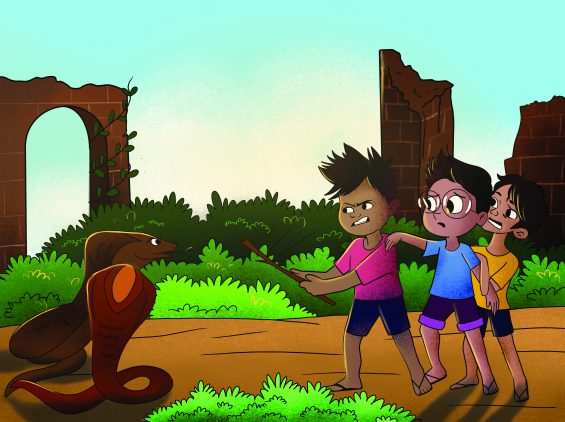
Karan was about to hit the snakes using his pointed stick, but Mohan caught his hand and said, “Don’t hurt them!” he whispered. “Stand still and they’ll go away.”
Sure enough, soon the snakes slithered away.
“You see Karan, snakes are shy. They don’t attack till they feel threatened.
If you had hurt them, they would have attacked us,” explained Mohan.
The three friends then tiptoed through the grounds and finally saw the well. But just before they could go near the well, they heard a rustling noise! Was that some wild animal that would attack them?
They took a step back and looked inside and saw two rabbits running away!
With a sigh of relief, the three went closer to the well and looked inside. It was deep. Plants and weeds had grown along its walls. They could not see the bottom. One of them would have to climb down to get the treasure!
“Mohan, you are the thinnest. You should climb down!” said Karan. Yash is heavy and we will not be able to pull him out.”
Yash laughed but was secretly happy that his weight had saved him from climbing down. He did not want to get stuck inside the well! Mohan tied one end of the rope to a tree trunk and tied the other end to his waist.
“Yash and Karan, release the rope slowly.
Once I reach the bottom, I’ll find the treasure and put it in the bags. Then I’ll shout so that you can pull me up.”
Mohan balanced himself along the side of the well and slowly started climbing down easily. When he reached the bottom, he looked all around for the treasure that was not there.
Instead of the gold coins, he was expecting, he saw a scared white baby rabbit that tried to hide when Mohan reached to pat it.
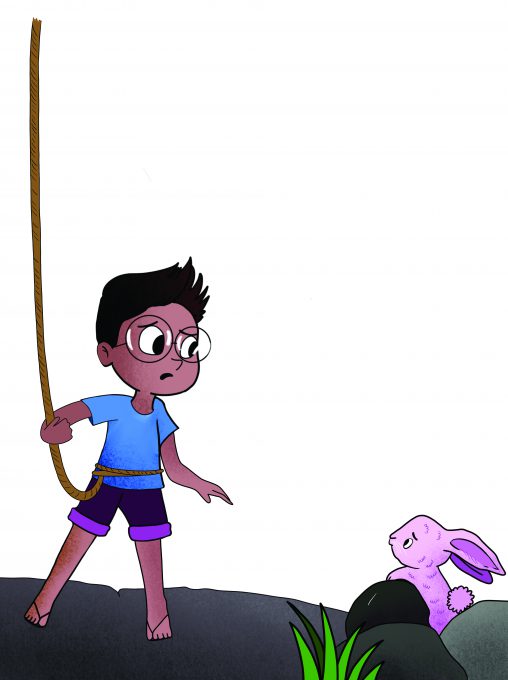
Mohan realised that the baby rabbit must have fallen into the well. The two rabbits that scurried when they had reached the well must have been her parents.
Thankfully, there was no water in the well, otherwise, the baby would have drowned.
Mohan carefully picked up the rabbit and put her in his bag. He used his pickaxe to make some holes in the bag for her to breathe. He took the bag on his back and tied the pickaxe to the rope. Then he called Yash and Karan to pull him. Yash and Karan were thrilled because they thought that Mohan had found the treasure. They started pulling the rope with all their might. Mohan, too, started carefully climbing upwards.
When he reached the top, Yash caught Mohan’s hand and pulled him out.
They were all exhausted and lay flat on the grass for some time.
Then Yash could not hold himself and picked up the bag Mohan had dropped on the ground and opened it. He wanted to see what was the treasure they had found!
But the treasure inside the bag was scared of Yash and started jumping. Yash dropped the bag in fear and Mohan took the rabbit out of the bag and told them that this was the only treasure he found inside the well.
Karan said, “Mohan, you are kind. I wish everyone was as kind as you are. So many animals can be saved by our small acts of kindness.”
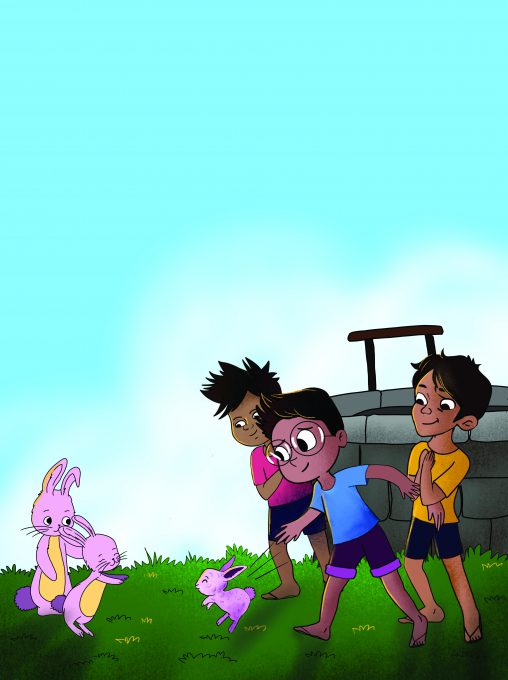
Just then, they saw the rabbits coming back looking for their young one. Mohan released the baby rabbit in the direction of her parents. The rabbits were overjoyed upon being reunited. The three friends were also overjoyed—the treasure they found was a unique one.



